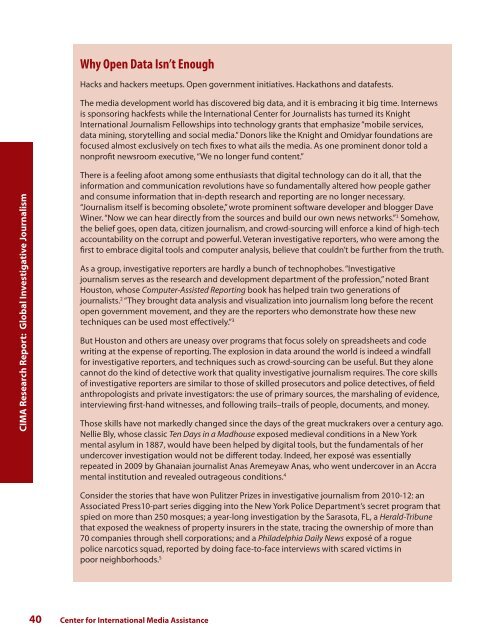CIMA-Investigative Journalism - Dave Kaplan
CIMA-Investigative Journalism - Dave Kaplan
CIMA-Investigative Journalism - Dave Kaplan
You also want an ePaper? Increase the reach of your titles
YUMPU automatically turns print PDFs into web optimized ePapers that Google loves.
<strong>CIMA</strong> Research Report: Global <strong>Investigative</strong> <strong>Journalism</strong><br />
Why Open Data Isn’t Enough<br />
Hacks and hackers meetups. Open government initiatives. Hackathons and datafests.<br />
The media development world has discovered big data, and it is embracing it big time. Internews<br />
is sponsoring hackfests while the International Center for Journalists has turned its Knight<br />
International <strong>Journalism</strong> Fellowships into technology grants that emphasize “mobile services,<br />
data mining, storytelling and social media.” Donors like the Knight and Omidyar foundations are<br />
focused almost exclusively on tech fixes to what ails the media. As one prominent donor told a<br />
nonprofit newsroom executive, “We no longer fund content.”<br />
There is a feeling afoot among some enthusiasts that digital technology can do it all, that the<br />
information and communication revolutions have so fundamentally altered how people gather<br />
and consume information that in-depth research and reporting are no longer necessary.<br />
“<strong>Journalism</strong> itself is becoming obsolete,” wrote prominent software developer and blogger <strong>Dave</strong><br />
Winer. “Now we can hear directly from the sources and build our own news networks.” 1 Somehow,<br />
the belief goes, open data, citizen journalism, and crowd-sourcing will enforce a kind of high-tech<br />
accountability on the corrupt and powerful. Veteran investigative reporters, who were among the<br />
first to embrace digital tools and computer analysis, believe that couldn’t be further from the truth.<br />
As a group, investigative reporters are hardly a bunch of technophobes. “<strong>Investigative</strong><br />
journalism serves as the research and development department of the profession,” noted Brant<br />
Houston, whose Computer-Assisted Reporting book has helped train two generations of<br />
journalists. 2 “They brought data analysis and visualization into journalism long before the recent<br />
open government movement, and they are the reporters who demonstrate how these new<br />
techniques can be used most effectively.” 3<br />
But Houston and others are uneasy over programs that focus solely on spreadsheets and code<br />
writing at the expense of reporting. The explosion in data around the world is indeed a windfall<br />
for investigative reporters, and techniques such as crowd-sourcing can be useful. But they alone<br />
cannot do the kind of detective work that quality investigative journalism requires. The core skills<br />
of investigative reporters are similar to those of skilled prosecutors and police detectives, of field<br />
anthropologists and private investigators: the use of primary sources, the marshaling of evidence,<br />
interviewing first-hand witnesses, and following trails–trails of people, documents, and money.<br />
Those skills have not markedly changed since the days of the great muckrakers over a century ago.<br />
Nellie Bly, whose classic Ten Days in a Madhouse exposed medieval conditions in a New York<br />
mental asylum in 1887, would have been helped by digital tools, but the fundamentals of her<br />
undercover investigation would not be different today. Indeed, her exposé was essentially<br />
repeated in 2009 by Ghanaian journalist Anas Aremeyaw Anas, who went undercover in an Accra<br />
mental institution and revealed outrageous conditions. 4<br />
Consider the stories that have won Pulitzer Prizes in investigative journalism from 2010-12: an<br />
Associated Press10-part series digging into the New York Police Department’s secret program that<br />
spied on more than 250 mosques; a year-long investigation by the Sarasota, FL, a Herald-Tribune<br />
that exposed the weakness of property insurers in the state, tracing the ownership of more than<br />
70 companies through shell corporations; and a Philadelphia Daily News exposé of a rogue<br />
police narcotics squad, reported by doing face-to-face interviews with scared victims in<br />
poor neighborhoods. 5<br />
40 Center for International Media Assistance


